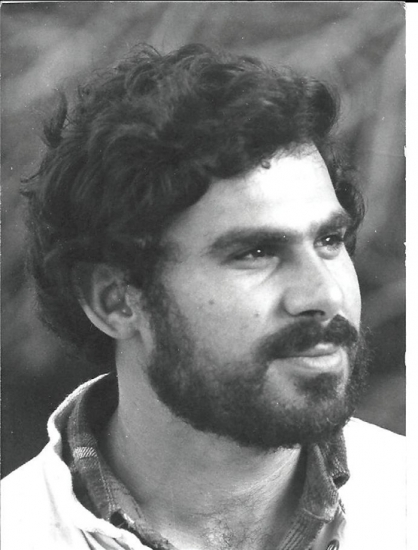
Yitzak Aisenberg
The 1973 Yom Kippur War broke out four years after I made aliyah. In those four years I met and married Yitzhak (Itzik) Aisenberg, a Russian born kibbutznik and our first child Boaz was two years old when his father was whisked off to war, returning for a short leave six weeks later.
With long hair, a bushy black beard, ill-fitting army uniform and a pair of boots that the soles were partially parted from the uppers - neither I nor our son recognized the trampish looking character leaning against a fence in the children’s playground. As he moved forward to scoop up his son, Boaz began yelling and ran away. It was only after Itzik had showered, trimmed his beard to a neat chin clinging version, did his son recognize him and tag after him everywhere he went for the all too short furlough.
Many years have passed and another four children and five grandchildren born unto the Aisenberg clan, none of the latter Itzik having gotten to know as he tragically died a few months before our first grandchild was born.
Unfortunately, since 1973 we have known far too many wars and only the most naïve could think we have seen the last.
When he was four years old Boaz received a set of Lego brought over from Britain by a visiting aunt. Whilst Boaz sat on the stone floor and trying to figure out what went where with the Lego pieces, my aunt asked how I would deal with his having to go to the army at 18. In those days I was very naïve. “Don’t be silly Aunty, by the time Boaz is 18 there will be peace and no need for an army,” I retorted. Nowadays 40 years-old, the father of two small children, Boaz is an invalid veteran of the IDF who for the last 20 years has been under the excellent care and watchful eye of the Israeli Ministry of Defense who also provide him with on-going necessary medical care, a car and monthly stipend.
He says he holds no illusions as to where his daughter will be in 14 years time or his son in another 15.
Over the years when my late Aunty Sheila and I would meet up at family celebrations in the UK she would often start a sentence with “Lydia dear, do you remember when you said…” and I would cut her short and say, “Yes Aunty, I remember.” How could I forget?
October 1973 – Yom Kippur and a quiet, laidback day anticipated by the Aisenberg family. In the morning a long walk in the beautiful, extensive forest behind Mishmar HaEmek. Boaz was perched on Itzik’s shoulders for most of the walk. When he was not thumbing a lift from Dad, he would busily kick the piles of leaves and twigs on the ground and collect a few to take home. My job was to carry them and an assortment of stones he was particularly attracted to.
Returning to our room and a half, we set about having a siesta. Behind our abode, in more spacious accommodation, lived Yaakov Hazan, a founder member of the soon to be 90 year-old kibbutz, co-founder of the Mapam political party and member of Knesset from 1949 to 1973.
As a Knesset member, Hazan was allowed a telephone in his private kibbutz abode – one of the very few with such a privilege in the kibbutz at that time.
Around two o’clock noon we could hear Hazan yelling on the phone. As it was Yom Kippur we realized that something serious was afoot.
My next door neighbor Tammy burst into our room telling me to tune into the BBC. After all it was Yom Kippur and there were no Israeli radio broadcasts. Sitting around the radio in the corner of our room we heard from a clipped accented British announcer that Israel was being attacked. We were at war.
In those days, so few phones, no mobiles, Blackberries, laptops and all the modern fan-dangled in your pocket communications systems, the system of emergency call up was simply that one collected another and within six hours Israel’s reserves mobilized.
Upon hearing the news, Itzik climbed up into a crawl space in our roof where he stored an ever-ready kitbag full of the necessities for such an occasion as well as the annual 5-week reserve duty. A decorated veteran of the 1967 war, he was quickly organized, in army uniform and laboriously lacing up the shin-high army boots. A jeep screeched to a halt outside. “That’s for me,” I heard him say. He bent down, picked up Boaz, gave him a hug and handed him over to me, quick peck on the cheek, turned and left.
Three men sat in the jeep, a private vehicle. Yitzik slung his kitbag into the back, climbed in and the jeep sped off down the track … with our young son, screaming for his father running as fast as his little legs could carry him behind the disappearing vehicle.
We were not to see Itzik again for almost one and a half months, he was unable to call and we became dependent on postcards and letters all of which were censored by the army.
As soon as the news of the war broke the kibbutz also immediately became mobilized. A siren system and loudspeakers placed in strategic points throughout the kibbutz kicked into action. Members not called to duty outside are called to duty within the community. First thing, clean out the air-raid shelters all of which were in a sorry state. Then fit them with mattresses, blankets, water supplies and in the shelters closest to the children’s houses, books, toys and clean clothing.
Boaz and his peers thoroughly enjoyed sleeping in the shelter attached to his kindergarten. The whole floor covered in mattresses and cushions, no boards in between, kids could roll over each other and over ma and siblings.
During the day when sirens rang out – in our case it was because of Frog rockets from Syria landing in our valley or crippled planes attempting an emergency landing at the Ramat David airbase also in the valley – then one dropped everything and ran to a pre-designated place. I was ‘attached’ to the kindergarten brigade.
When the siren’s piercing notes rang out, I would run, collect up any child in the play area and duck into the shelter. One time I remember vaulting over the fence around one of the kindergarten courtyards, scooping up two youngsters in the sandpit as another lady took the other two and when reaching the shelter everybody burst out laughing as I had split my work pants and my underwear was peeking through the gap!
A list of names of members called up from Mishmar HaEmek was pinned to the notice board in the dining-room. All windows in the kibbutz abodes, classrooms, offices and dining-room were blacked out with black plastic produced in the kibbutz factory. The list on the dining room wall was very long, containing the names of those kibbutz youths serving their national service at the time and the reservists like Itzik who had just dropped everything and gone off.
One name was left off from the very beginning. Kibbutz born pilot and farmer Hanan Aitan – married with two children – had taken off from Ramat David at noon and shot out of the skies by the Syrians just minutes later. In the morning he had gone to plough kibbutz fields running parallel to the Ramat David air base runway and was called to the base where he exchanged his blue kibbutz work clothes for his pilot’s gear. When he was shot down his wife thought he was still ploughing the fields.
High school students became runners, bringing messages scrawled on scraps of paper by those manning the few phones in the kibbutz offices at the time. The three public phones on the wall outside the dining-room saw long queues of members trying to phone their families outside the kibbutz or abroad. When a message was received from one of the soldiers, a tick was put next to their name on the list in the dining-room.
After ten days there were only three names left tickless on the board, one of which was Yitzhak Aisenberg.
When the all awaited messages finally arrived I ran to the dining-room with the largest felt pen I could find and put an enormous tick next to Itzik’s name, sat on the floor and burst out crying. Another name on the list, a young lad doing national service with a tank unit, was ticked a short time later but Uri Alajem, the kibbutz general secretary was missing in action in Sinai but later declared killed in action. His body was not retrieved for a long time and his only child Itamar was one of Boaz’s toddlers group.
The first message I received came from a nurse in a hospital somewhere in the south of the country. An injured soldier had given her a list of names of those he had seen alive before being evacuated from the Egyptian side of the Suez Canal. The nurse – like so many other regular folks at the time – got down to contacting all the families. The message I received was that Yitzhak Aisenberg had last been seen alive at such and such a time and date. Apparently his tank force was in the town of Suez, cut off by Egyptian forces. The seriously injured soldier had been brought back through enemy lines and before being taken into the operating theater gave the names of soldiers he had seen before evacuation.
I never found out the name of either the soldier or the nurse.
Carefully kept in a red folder with clear plastic pockets and Itzik’s distinctive handwriting stating YOM KIPPUR WAR and the dates 6.10.1973 – 3.5.1974 (the day he was eventually demobilized) on the cover, are army issue postcards and long letters home penned by IDF soldier Aisenberg, Yitzhak No. 255542 during that period.
The postcards are flimsy and on one side humorous military cartoons that would be more suitable for an episode of Dad’s Army and not the real thing from whence these were being sent home from the fighting front. One of the first written was penned on 12.10.1973. With little room to actually write anything, Itzik pens he is doing so by the light of a slivery moon and that he is longing to be home.
One of the letters, written on 28.10.1973, is six pages long and headlined SUEZ. He describes being in seventh heaven having received five letters and a parcel of goodies from home. Three of the letters are from Boaz and me, two from his parents and sister in Herzliya and the parcel of goodies from home - the kibbutz.
He describes the beauty of the area they are in – and of his tank unit and others closely guarding 30,000 trapped Egyptian soldiers of the Egyptian Third Army, and a great deal more. The army censor didn’t black out anything this time.
A postcard sent a few days earlier to Boaz (with my name in brackets) and also marked Suez strikes a chord of the absurd in as much it is a color picture postcard of Bialik Street in Ramat Gan. One of his soldier buddies was from Ramat Gan and can only assume he received the card from him – in Egypt!
Using Boaz’s nickname Bo-Bo, Itzik tells him that these tough times will pass. “The most important thing Bo-Bo is to carry on. Take good care of mum and tell her not to worry too much, it’s enough that I do. Okay, my son?”
Almost four decades later, with more wars and intifadas than one can count on one’s hand since 1973 – I am still worrying.
First published in the Jewish Telegraph, UK, 28 September 2011.
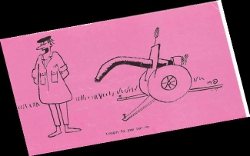
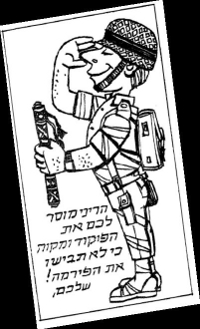
Army issue postcards with humorous military cartoons sent from the battle front, during the Yom Kippur War, 1973 by IDF soldier Yitzhak Aisenberg to his wife Lydia.
 ESRA Golf Competition 2012
ESRA Golf Competition 2012 Upside-Down Coffee – for another world. A Review
Upside-Down Coffee – for another world. A Review If I could tell you - a review
If I could tell you - a review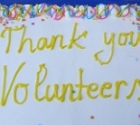 A new website in English - on Volunteering - Launched in Israel
A new website in English - on Volunteering - Launched in Israel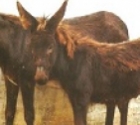 Help Needed for Abused Horses and Donkeys
Help Needed for Abused Horses and Donkeys Heather's Heseg
Heather's Heseg Lydia Aisenberg
Lydia Aisenberg